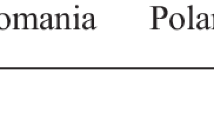
Overview
- Provides a comparative studies of populism, clientelism and corruption
- Covers less researched Balkan country cases
- Critically reviews previous interpretations and explanations of the backsliding of democracy
Part of the book series: New Perspectives on South-East Europe (NPSE)
Access this book
Tax calculation will be finalised at checkout
Other ways to access
About this book
Similar content being viewed by others
Keywords
Table of contents (12 chapters)
-
Front Matter
-
Back Matter
Reviews
“The book represents an important contribution to contemporary studies of democracy and provides its readers with an innovative approach to state–society relations. Focused on three successor countries of Yugoslavia, its relevance goes far beyond this region and should be of interest to any scholar interested in what makes democracy sustainable.” (Dušan Spasojević, Comparative Southeast European Studies, Vol. 71 (4), 2023)
This book is a "Must-Read" for those interested to grasp the fluidity of dynamics marking the Yugoslav successor states, and particularly Serbia, Montenegro and North Macedonia. The author insightfully describes how corruption, clientelism, and populism dramatically squeeze these countries in a vice grip between democratization and its reversal. The image of the "irregular pendulum of democracy" helps focusing on key mechanisms causing the backsliding of democracy in this European region.
Stefano Bianchini, University of Bologna, Italy
The first original contribution of this book is a productive analytical merge of populism, clientelism and corruption with specific strategies that elites employ to push democracy downhill. The second one is a refined analysis of an “irregular pendulum of democracy” in Serbia, Montenegro and North Macedonia. Sotiropoulos’ arguments are clear and convincing. His sophisticated empirical analysis is firmly based in theory and sovereign knowledge of post-Yugoslav politics.Jovan Teokarević, University of Belgrade, Serbia, and College of Europe, Belgium
The author offers a lucid account of the weakening of democratic institutions in the Western Balkans and a theoretical explanation of the causal mechanisms enabling authoritarian-minded leaderships to hold on power. Drawing on democratization theory and extensive fieldwork, the book presents a deeply thought-out analytical scheme of authoritarian trends that is worth testing in other regions as well.Nikolaos Tzifakis, University of the Peloponnese, Greece
Authors and Affiliations
About the author
Bibliographic Information
Book Title: The Irregular Pendulum of Democracy
Book Subtitle: Populism, Clientelism and Corruption in Post-Yugoslav Successor States
Authors: Dimitri A. Sotiropoulos
Series Title: New Perspectives on South-East Europe
DOI: https://doi.org/10.1007/978-3-031-25609-7
Publisher: Palgrave Macmillan Cham
eBook Packages: Political Science and International Studies, Political Science and International Studies (R0)
Copyright Information: The Editor(s) (if applicable) and The Author(s), under exclusive license to Springer Nature Switzerland AG 2023
Hardcover ISBN: 978-3-031-25608-0Published: 01 May 2023
Softcover ISBN: 978-3-031-25611-0Published: 02 May 2024
eBook ISBN: 978-3-031-25609-7Published: 30 April 2023
Series ISSN: 2662-5857
Series E-ISSN: 2662-5865
Edition Number: 1
Number of Pages: XXIV, 401
Number of Illustrations: 2 b/w illustrations, 1 illustrations in colour
Topics: Comparative Politics, European Politics, Political Sociology



